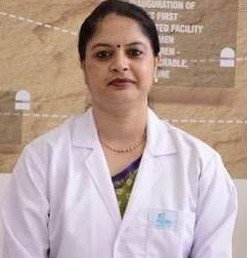Difference between Sterility and Infertility
Written by Charu Shrivastava, last updated on 1 November 2022| min read

Quick Summary
- Sterility is the inability to produce offspring, while infertility is the inability to conceive a child.
- Sterility is usually permanent, while infertility can be temporary or permanent.
- Sterility can be caused by a variety of factors, including genetic disorders, hormonal imbalances, and medical conditions.
In the field of biology, even the most basic genetic concepts can be overwhelming, and terms are unfamiliar or unheard of. Two such terms, “sterility” and “infertility”, often used synonymously, are actually quite different. Most people who consider themselves sterile are, in reality, only infertile. Moreover, the confusion between these two terms has led to several misconceptions. Continue reading the blog below to understand the differences between sterility and infertility.
What is Sterility?
Sterility refers to the inability to get pregnant and have children even with medical intervention. It can result from a congenital anomaly (for example, being born without ovaries) or surgical intervention (such as tubal ligation and hysterectomy for women and vasectomy for men). Male sterility includes the absence of sperm in the semen or the presence of other reproductive defects. Similarly, female sterility is the absence of ovulation.
There are two different types of sterility:
There are two different types of sterility:
- Primary sterility - when a couple has never been able to get pregnant
- Secondary sterility - when a couple has had a successful pregnancy but cannot conceive another child due to surgical intervention


What is Infertility?
Infertility is a common problem that refers to the inability to conceive after twelve months of having unprotected intercourse. If the woman is 35 years or more, this period is shortened to six months. Infertility can result from an issue with either the male, female, or both. Unlike sterility, infertility in males and females is not necessarily due to a procedure or medical condition. Infertility can also be caused due to reasons such as lack of ovulation and low sperm count and motility.
There are two different types of infertility:
There are two different types of infertility:
- Primary infertility - when a couple has never achieved a full-term pregnancy after at least one year of unprotected sex
- Secondary infertility - when a couple has had one successful pregnancy but is unable to conceive again
Symptoms of infertility in males and females
| Males | Females |
|
|
How is Sterility Different from Infertility?
While both sterility and infertility are problems related to conceiving, they are not the same. Both differ in terms of conceiving a baby and treatments. While infertility can be treated, one cannot treat sterility. This is why infertility has a higher chance of creating a family than sterility.
Sterility and infertility often co-exist. For instance, a man who had a vasectomy is considered sterile and, as a result, infertile. However, if a man with no infertility problems has a sterile female partner, the couple would suffer from infertility. There are several reasons for sterility and infertility in men and women. The following is a table that compares the causes of both.
The causes of sterility can also be reasons for infertility in males and females. Why? Because sometimes, despite these disorders, fertilisation occurs, but full-term pregnancy is not achieved.
Sterility and infertility often co-exist. For instance, a man who had a vasectomy is considered sterile and, as a result, infertile. However, if a man with no infertility problems has a sterile female partner, the couple would suffer from infertility. There are several reasons for sterility and infertility in men and women. The following is a table that compares the causes of both.
Males |
Females | |
| Sterility |
|
|
| Infertility |
|
|
The causes of sterility can also be reasons for infertility in males and females. Why? Because sometimes, despite these disorders, fertilisation occurs, but full-term pregnancy is not achieved.
Can Sterility and Infertility Be Diagnosed and Treated?
While, unfortunately, sterility is an incurable problem, infertility can be treated. Infertility treatment depends on multiple factors, such as:
If these treatments fail to achieve a pregnancy, you can try to get pregnant through Assisted Reproductive Technology (ART). The most common type of ART technique is In Vitro Fertilisation (IVF). It is a multi-step procedure that involves stimulating ovaries, retrieving mature eggs, fertilising them with sperm in a laboratory, and implanting the fertilised embryo in the uterus.
- The cause of infertility (some causes cannot be corrected)
- The duration of infertility
- Your and your partner’s age
- Personal preferences
| Males | Females | |
| Diagnosis | Male fertility tests include:
|
Female fertility tests include:
|
| Treatment |
|
|
If these treatments fail to achieve a pregnancy, you can try to get pregnant through Assisted Reproductive Technology (ART). The most common type of ART technique is In Vitro Fertilisation (IVF). It is a multi-step procedure that involves stimulating ovaries, retrieving mature eggs, fertilising them with sperm in a laboratory, and implanting the fertilised embryo in the uterus.
Takeaway
There is a significant difference between sterility and infertility, but it is often overlooked. While sterility means you cannot conceive a baby, infertility can achieve pregnancy with medical or surgical intervention. However, sterility does not mean that you and your partner cannot become parents. It just implies that your journey to parenthood will be quite different. Choosing a gestational carrier or adoption can help you fulfil your dream of parenthood.
Seek Medical Guidance
Are you concerned about being infertile? You can contact our fertility experts at HexaHealth to understand more about the causes, symptoms, and treatments of infertility. Our experienced medical professionals will guide you through the entire process of evaluating your sterility or infertility. Moreover, we will suggest a tailored treatment option to best suit your requirements. Visit our website at https://www.hexahealth.com/ for more information.
Frequently Asked Questions
Does sterility mean infertility?
No, sterility and infertility are not the same. While sterility refers to the inability to produce a child, infertility is the failure to conceive after one year of unprotected intercourse. Infertility can be a type of sterility. However, every person diagnosed as infertile is not sterile.
What is the difference between sterility and impotence?
While both sterility and impotence can affect a man’s ability to have children, they are quite different. Sterility refers to the inability to conceive due to problems with the production or release of sperm. On the other hand, impotence, also called Erectile Dysfunction (ED), refers to the trouble of getting or maintaining an erection during sexual activity.
What can cause sterility?
Sterility can be caused by either a congenital anomaly (such as being born without ovaries) or as a result of surgical intervention (such as hysterectomy for women or vasectomy for men).
What causes sterility in females?
The causes of female sterility include:-
- Hormonal imbalance
- Cervical abnormalities caused by surgical intervention
- Damaged or blocked fallopian tube
- Malformations, polyps, or endometriosis in the uterus
Does sterile mean no sperm?
While the absence of sperm production can cause sterility, there are other causes as well. Male sterility can also occur due to testicles or sperm production problems. Therefore, being sterile does not necessarily mean no sperm.
Can a sterile woman get pregnant?
No, sterile women cannot get pregnant. However, if a woman is sterile due to tubal ligation or female sterilisation, she may get pregnant after a tubal ligation reversal surgery. The surgery reconnects the blocked segments of the fallopian tube, allowing the woman to become pregnant.
Can a fertile man become infertile?
Yes, a fertile man can become infertile. A man can become infertile even after successfully conceiving a baby. This is called secondary infertility. Some causes for secondary infertility include increased age, impaired sperm production, sexually transmitted diseases, enlarged prostate, excessive weight gain, alcohol abuse, and smoking.
Is Sterility treatable?
In most cases, sterility cannot be treated. However, sterility caused by surgical intervention can usually be reversed. Women who previously had tubal ligation can get tubal ligation reversal surgery to be able to conceive a child. Similarly, men with vasectomy can increase their chances of having a child with vasectomy reversal. However, these procedures do not guarantee success in conceiving a baby.
Last Updated on: 1 November 2022
Disclaimer: The information provided here is for educational and learning purposes only. It doesn't cover every medical condition and might not be relevant to your personal situation. This information isn't medical advice, isn't meant for diagnosing any condition, and shouldn't replace talking to a certified medical or healthcare professional.
Reviewer

A specialist in Obstetrics and Gynaecology with a rich experience of over 21 years is currently working in HealthFort Clinic. She has expertise in Hymenoplasty, Vaginoplasty, Vaginal Tightening, Labiaplasty, MTP (Medical Termination...View More
Author

Charu Shrivastava
BSc. Biotechnology I MDU and MSc in Medical Biochemistry (HIMSR, Jamia Hamdard)
3 Years Experience
Skilled in brand marketing and SEO-driven medical content that educates and engages patients, healthcare professionals, and the general public. With medical writing and proofreading expertise, she ensures accuracy,...View More
Expert Doctors (10)
NABH Accredited Hospitals (5)
Latest Health Articles



















 Open In App
Open In App